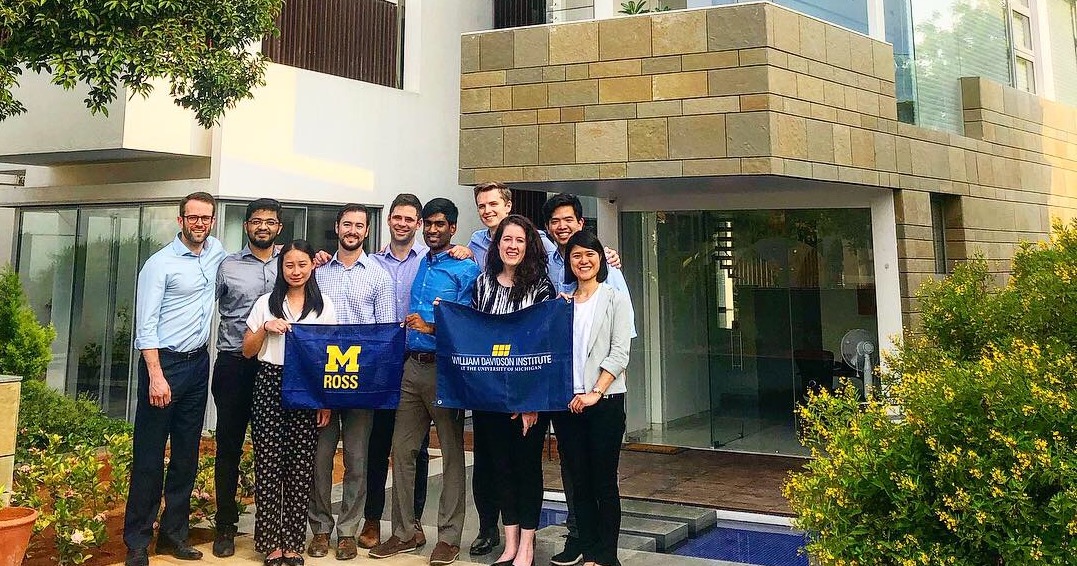
Members of the International Investment Fund and MADE MAP teams working in India this past March.
WDI is partnering with the Ross School of Business and Finance Professor Gautam Kaul to establish a curriculum-based, student-run international investment fund at the University of Michigan, believed to be the first of its kind at a U.S. university.
The fund, called the International Investment Fund (IIF), will target small- and medium-sized enterprises (SMEs) in India. Graduate students enrolled at Ross and in joint-degree programs with other U-M schools and colleges will be responsible for investing, managing and growing the investment portfolio as part of a course at Ross. WDI has worked closely with Kaul to develop the fund and made an initial financial commitment to the fund.
 And while the course at Ross won’t begin until winter semester in 2020, work has been ongoing for multiple years. This past winter a Ross student MBA team sponsored by WDI traveled to India to conduct an initial round of due diligence on local SMEs to assess the viability of the process and the potential for investments. Students and Ross faculty are also working to establish a protocol for the fund and received assistance from the University of Michigan Law School on the legal requirements on both the U.S. and Indian sides.
And while the course at Ross won’t begin until winter semester in 2020, work has been ongoing for multiple years. This past winter a Ross student MBA team sponsored by WDI traveled to India to conduct an initial round of due diligence on local SMEs to assess the viability of the process and the potential for investments. Students and Ross faculty are also working to establish a protocol for the fund and received assistance from the University of Michigan Law School on the legal requirements on both the U.S. and Indian sides.
Forty students applied to be part of the fund and the class and 13 were selected. They will travel to India in August to conduct more work and due diligence on SMEs. Another 13 students will be added during the next academic year, Kaul said, and the eventual target for the fund is 35-40 student advisors all chosen after a rigorous application and interview process.
Kaul, who started Ross’ successful Social Venture Fund, said he has thought about an international fund for years and has received encouragement from students to start one. He said he started work with some second- and third-year MBA, Erb Institute and public policy graduate students on the idea about four years ago. He said it became obvious he couldn’t replicate the Social Venture Fund, which invests only in the U.S.
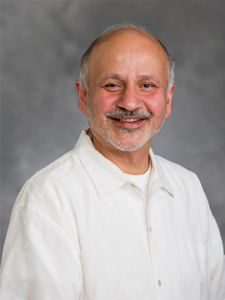
Professor Gautam Kaul
“It’s quite an adventure to go to another country and initiate something so complex,” said Kaul, the Robert G. Rodkey Collegiate Professor of Business Administration & Professor of Finance. “Just to get to know the system takes a while.”
He also said the university and Ross didn’t want to start this alone, but potential international partners on the ground “wanted proof of concept.”
Kaul approached WDI President Paul Clyde to see if the institute was interested in partnering because of its global focus and work with budding entrepreneurs. Clyde said the idea of an international investment fund “fit with our Finance sector goals, which is to figure out ways to make funding available at a lower cost to small- and medium-sized enterprises.”
Additionally, in 2017 WDI, the Zell Lurie Institute for Entrepreneurial Studies at Ross and the Aparajitha Foundations in India established the Michigan Academy for the Development of Entrepreneurs (MADE), a nonprofit institute. MADE works with entrepreneurship development organizations (EDOs) in the Tamil Nadu state of India to give individuals operating businesses in these environments the knowledge and best practices they need to thrive.
Kaul said it is a “huge advantage” that WDI has a partner on the ground in India already working with entrepreneurs.
Twenty-seven SMEs recently completed a business development program managed by MADE and its EDO, Poornatha. The entrepreneurs took monthly classes at MADE designed to help them develop financial projections, future financial plans and other necessities for potential funders, including complete financial statements.
Clyde said each of the 27 SMEs are entrepreneurs with a vision where they want to go, who have identified areas they saw as opportunities for growth and are in need of capital investment.
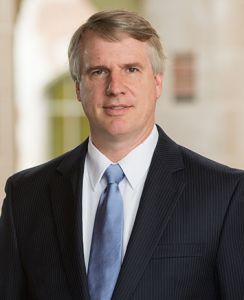
WDI President Paul Clyde
“And we know something about their character,” he said. “Through MADE, our partner has spent a lot of time getting to know them. They weren’t a random group of people. Further, we had always planned to add financing to the array of products and services offered by MADE.
“So when Gautam called with this opportunity to marry what we were already doing with MADE with this investment fund, it seemed like a perfect fit.”
Kaul said he hopes the fund will make its first investment by the end of 2020. He said if the fund was making an investment in the U.S. it would take two months to do a deep due diligence after identifying a potential start up following some pre-screening.
“In the context of this Indian initiative, it’s never been done so it could take nine months,” he said. “The purpose here is to make an investment and hope it starts paying off. But all profits go back into the fund so we can invest in someone else.”
Kaul said the course and the investment fund is “very applied, on-the-ground, experiential” and what he thinks is the future of university education.
“It is very complex, which makes me very excited,” he said. “It has got the beginnings of what I think is the future of global education. It will differentiate Ross. You’re not coming here sitting in a classroom – well, maybe for the first six months – but after that you’re all over the world.
“You’re not learning just from faculty but from the environment and everything else. That’s what the demand is for.”
Kaul said WDI has been a great partner and instrumental in making the fund a reality. While WDI is located on campus and strongly affiliated with the university, its independence gives it flexibility and maneuverability for projects such as the investment fund.
“Without WDI, I would have given up,” he said.
Clyde said in addition to the initial investment, WDI will support the travel needs of the students running the fund. Kaul is the faculty advisor for the fund and Clyde said he will help where needed and continue to be closely involved.
Kaul said the fund appeals to students who want an international, hands-on experience, but may also want to work in global settings.
“If you want to go to India and eat Indian food, this is not for you,” he said. “This is serious stuff. You have to worry about global issues, you have to worry about India, and you must take ownership of your learning. If you go there, you should be keen on learning from and helping people on the ground.”
WDI has been working with Aravind Eye Care Hospitals, one of the largest eye care hospitals in the world, for twenty years. This year’s work included developing a five-year strategic plan for the newest Aravind Eye Hospital (AEH) located in Chennai. The plan focused on three pillars: clinical care, academics and research. The goal of AEH in Chennai is to treat 3,000 patients and conduct 300 surgeries per day. Recommendations were provided around operations and human resources that could support the higher future patient inflow.
The market analysis for NeoVent, a low-cost non-electric ventilator, for the Indian market was conducted. Based on the market attractiveness, a comprehensive market entry strategy was developed that included identification of customer segments (including geographies and sector), distribution channels, regulatory strategy, partnerships with various stakeholders including the government etc.
This research project aimed to identify the factors influencing the performance of energy enterprises in emerging markets and provide a framework and methodology for documenting and assessing these models. Based on a literature review, the team of six School for Environment and Sustainability (SEAS) master’s students identified factors that relate to the technical, business, policy and socio-economic contexts that energy enterprises operate within. These factors were then used to develop an interview guide for expert interviews in India and Uganda. As part of the final report, the team compiled a repository of energy business models using these factors as a consistent assessment methodology.
This research project, in collaboration with the Miller Center, gathered data from enterprises that were part of the Energy Access India portfolio, impact investors and other ecosystem players to identify learnings that may be helpful to entrepreneurs seeking to enter the energy access space in India. These learnings are also relevant to investors interested in supporting these enterprises, and those stakeholders that seek to improve the ecosystem of support. Data was collected through in-person interviews conducted during a field visit to India, and through phone interviews and analysis of secondary data.
The findings from this work were published in a paper titled “Closing the Circuit: Accelerating Clean Energy Investment in India” and launched at the EAI end of project event in Delhi in September 2018. The paper has subsequently been disseminated through the ANDE Newsletter, and at events organized by the Miller Center for Social Entrepreneurship at SOCAP 2018. The findings have also been presented at an Energy Access Financing roundtable hosted by the Center for Strategic and International Studies.
In 2019, Ross School of Business kicked off the International Investment Fund, a WDI supported initiative. As part of that effort, WDI worked with students and faculty from Ross to establish the protocol, review the legal requirements from both U.S. and Indian perspectives, and completed an initial round of due diligence. In 2020, the fund continued by conducting due diligence, providing support to firms interested in becoming investment ready and investigating future opportunities for investments. Some of the SMEs are located in the state of Tamil Nadu, India and are affiliated with Poornatha (a MADE partner). The fund is now looking at ways to expand to other countries.
Studying for her master’s degree in public health, Alison Granger was interested in a course at the University of Michigan that would let her take the lessons from her textbooks and classroom lectures and put it into practice.
That’s why she enrolled in BA685: Healthcare Delivery in Emerging Markets, a course offered at the Ross School of Business.
“I was interested in getting a more in-the-field, global perspective on what I’ve learned so far in class,” said Granger, who traveled to Ethiopia for her project. “And I did with this class.”
The class is comprised mostly of MBA2 students, but also is open others pursuing other graduate degrees such as Granger. It’s designed to enhance participants’ international leadership capabilities, increase awareness of diverse business issues within the current global landscape, provide on-the-ground experience in a foreign country and contribute to the success of partner health clinics and hospitals. It is taught by WDI President Paul Clyde.
The course, organized and primarily funded by WDI with some financial support from Michigan Ross, responds to the increasing need for managers with international business perspectives to augment their business and management knowledge. During the first part of the term, students learned about healthcare in emerging markets through lectures, guest speakers and case discussions. Students were then divided into five teams and prepared for visits to their selected country, traveling to those destinations in late February and early March.
This year, student teams worked in Ethiopia, India, Kenya, Peru and Rwanda. All five teams presented recaps of their projects on April 22 at Michigan Ross.
Clyde said the travel-study course lets students combine what they learned in the classroom with hands-on experience in the field. It features a collaborative learning environment with faculty and students learning from each other in an action-based learning setting.
“Through this course teams of students from Ross, SPH and School of Information have provided our partner healthcare organizations value through analysis of their operations, customers and strategy,” Clyde said. “Through this experience, the students gain unusual insights into the opportunities and challenges of operating healthcare organizations in LMICs.”
Here is a recap of the BA685 projects:
More than 1 million infants die each year due to severe respiratory distress, with 99 percent of these deaths in low- to middle-income countries, according to the World Health Organization. Current noninvasive ventilators are expensive, require skilled operators, and fail during power outages that are common in emerging markets. AIM Tech developed NeoVent, a low-cost, low-tech, easy-to-use ventilator that is non-electric and has only one moving part. It also can be manufactured at scale for less than 1 percent the cost of conventional ventilators.
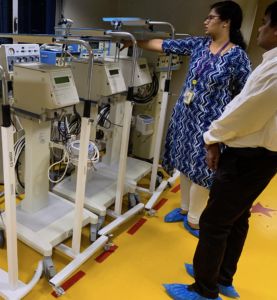 AIM Tech wanted the BA685 student team to evaluate if AIM Tech should enter the Indian market and provide recommendations for a market entry strategy. The students visited Delhi,
AIM Tech wanted the BA685 student team to evaluate if AIM Tech should enter the Indian market and provide recommendations for a market entry strategy. The students visited Delhi,
Mumbai and Chennai, and interviewed and provided product demonstrations to 24 healthcare facilities, one government official, two manufacturers and one distributor. The students found that the Indian healthcare market shows a high-growth trajectory. The government’s focus on entrepreneurship, insurance, and neonatology also creates favorable climate and demand for NeoVent, while clinicians see the product as unique, necessary and value it at a higher-than-planned price, the students noted.
They recommended AIM Tech license NeoVent to a multinational corporation with an existing foothold in the Indian market. Another suggestion was to pilot NeoVent with a large hospital following FDA approval.
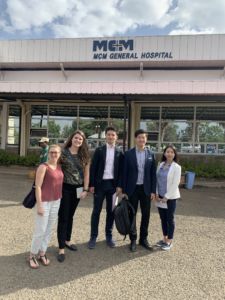 The lack of reliable, local liquid oxygen suppliers in Ethiopia for hospitals makes it necessary to have an oxygen separator system on the grounds for the hospital EADG is building. EADG asked the BA 685 students to study two questions: should EADG’s future hospital build and operate a medical gas plant?: and, should EADG sell excess medical gas to area hospitals?
The lack of reliable, local liquid oxygen suppliers in Ethiopia for hospitals makes it necessary to have an oxygen separator system on the grounds for the hospital EADG is building. EADG asked the BA 685 students to study two questions: should EADG’s future hospital build and operate a medical gas plant?: and, should EADG sell excess medical gas to area hospitals?
Based on research and interviews with hospitals with its own medical gas plants on-site, the students’ findings showed that EADG would benefit from building its own facility and could learn from other hospitals that have done the same. On the question of whether to sell excess medical gas, the students’ research showed it would not be a good decision to do so. It is not profitable, the research found, and there is robust competition and several barriers to entry in the market. The students encouraged EADG to begin the bidding process soon to select equipment suppliers because the hospital is expected to open in 2021. They also suggested EADG monitor the medical gas market for any movement or changes in government policy that might make it more profitable to sell excess medical gas.
Timely and accurate data reports are vital to operations at rural health clinics. Electronic records have been implemented, but poor staffing and internet connection have made e-records ineffective. The Ihangane Project, in partnership with nurses from rural health centers, created E-Heza Digital Health Record to deliver more timely and accurate data to the Rwanda Ministry of Health. The ministry has requested that E-Heza be expanded throughout Rwanda to serve maternal child care.
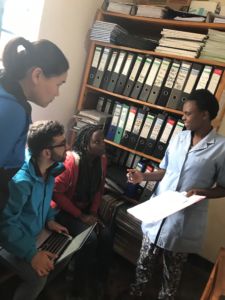 The BA 685 students project was to establish a framework for evaluating the efficiency of the current data reporting system and E-Heza in terms of timeliness, cost and data quality. To accomplish this, the students: analyzed the current lead time for data to move from point of care to the Ministry of Health; identified the cost of data reporting, including revenue loss; defined measurements to evaluate data accuracy; and developed framework to evaluate the efficiency of data reporting.
The BA 685 students project was to establish a framework for evaluating the efficiency of the current data reporting system and E-Heza in terms of timeliness, cost and data quality. To accomplish this, the students: analyzed the current lead time for data to move from point of care to the Ministry of Health; identified the cost of data reporting, including revenue loss; defined measurements to evaluate data accuracy; and developed framework to evaluate the efficiency of data reporting.
The students recommended a framework that evaluated efficiency in terms of timeliness, cost savings and data quality.
For next steps, the students recommended recording observational data for each process in the workflow, testing the framework for E-Heza and other health modules and exploring and quantifying the potential adverse effect due to poor data quality.
The Kisii Eye Care Institute started in 2013 and it has grown from an eye care service provider to a medical eye hospital and training center. It provides 3,000 surgeries annually but wants to increase the demand and capacity to 5,000 per year. Kisii operates as a social enterprise using an entrepreneurial approach to solve a social problem – avoidable blindness and visual impairment. Services are provided at normal rates for those who can afford them and substantially below cost to low-income members of their community.
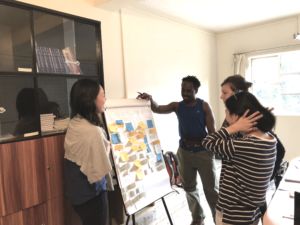 The BA685 student team put together a business plan for Kisii to increase demand for its services and improve operational efficiency. The students said surgery and optical services (glasses) are the largest revenue generators for Kisii and it must enhance its marketing strategy in both areas. Operationally, to decrease wait times and provide patients with a higher quality overall experience, current processes must be improved by standardizing the patient queue and improving counselor training, among other things. And to be ready for future growth, the current Kisii organizational structure must change, roles need to be redefined roles and responsibilities shifted.
The BA685 student team put together a business plan for Kisii to increase demand for its services and improve operational efficiency. The students said surgery and optical services (glasses) are the largest revenue generators for Kisii and it must enhance its marketing strategy in both areas. Operationally, to decrease wait times and provide patients with a higher quality overall experience, current processes must be improved by standardizing the patient queue and improving counselor training, among other things. And to be ready for future growth, the current Kisii organizational structure must change, roles need to be redefined roles and responsibilities shifted.
PAMS Policlinico wants to become a gastrointestinal (GI) center of excellence. It currently offers GI services and recently a GI doctor from the University of Michigan visited to develop an operational understanding.
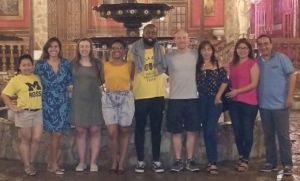 Last year’s BA685 team conducted a market analysis to determine how PAMS could grow to become a center of excellence in either GI or ophthalmology. This year’s student team built on that previous work and developed a complete business plan that: evaluated marketing strategy; studied GI equipment options to ensure there is an adequate plan for maintenance, repairs and acquisition; and, assessed opportunities to decouple skills and create a new position to take on some of the current physician duties. This business plan will be presented to potential PAMS funders this spring.
Last year’s BA685 team conducted a market analysis to determine how PAMS could grow to become a center of excellence in either GI or ophthalmology. This year’s student team built on that previous work and developed a complete business plan that: evaluated marketing strategy; studied GI equipment options to ensure there is an adequate plan for maintenance, repairs and acquisition; and, assessed opportunities to decouple skills and create a new position to take on some of the current physician duties. This business plan will be presented to potential PAMS funders this spring.
The students’ research and on-site observations and interviews showed: A lack of standardized practices lead to operational inefficiencies and lowered capacity even with sufficient personnel; contract incentives are not structured to achieve best outcome for PAMS; omission of certain accounting practice lowers visibility into financial health of PAMS and each specialties; and, the Polyclinic is one of the few providers of colonoscopies in the region.
The student team’s recommendations included: optimizing processes allowing for maximizing use of resources, including supplies and the time of healthcare providers; standardizing processes also decreases waste and allows more patients to be treated per week, ultimately increasing patient volume and with it, revenue.
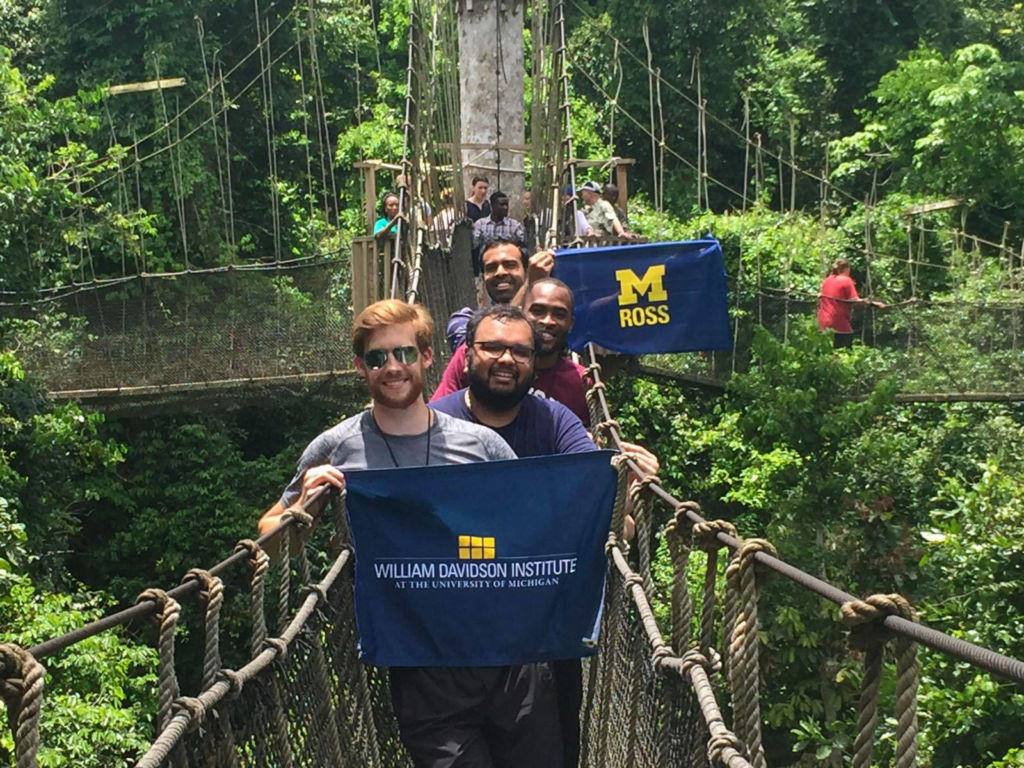
A 2018 WDI MAP team in Ghana.
Carrie Boyle, a MBA student at Michigan’s Ross School of Business, hopes to work in philanthropy somewhere in the U.S. after graduation. But for a couple of weeks in March, she is excited to be traveling to India as part of the school’s annual Multidisciplinary Action Projects (MAP).
“Working in another country is something I may never get the chance to do again,” she said. “This will be my first time in India and the country really interests me.”
Boyle and her teammates will work with Michigan Academy for the Development of Entrepreneurs (MADE), a nonprofit institute established at Ross by the Zell Lurie Institute for Entrepreneurial Studies, in partnership with WDI and Aparajitha Foundations. MADE works with entrepreneurship development organizations in India to help entrepreneurs operating small- and medium-sized enterprises (SMEs) succeed.
Boyle said she had some criteria when looking for MAPs that interested her.
“I wanted an opportunity to be on the ground having meaningful conversations with the people most immediately impacted by SMEs,” she said. “SMEs employ so many people and impact so many lives.”
Her teammate Shoko Wadano said she too is interested in working with SMEs, “which are very common in India.”
“I’m interested in how businesses mature in India,” she said. “I want to learn what pressures and impacts SMEs have in common, and what kind of value we can bring to them.”
WDI is sponsoring the MADE MAP project along with 10 others this year. MAP is an action-based learning course in which MBA students receive guidance from faculty advisors from WDI and Ross. Each project requires analytical rigor, critical thinking and teamwork. (Find out more about WDI’s MAP projects over the years here.)
After learning about their projects and conducting secondary research for several weeks, the student teams spend two to four weeks working with their organizations in the field.

David Butz
“The complementarities between the talents our students bring and what our sponsors need are sublime,” said David Butz, a WDI senior research fellow in the Healthcare sector who is an advisor on two projects. “Our students experience impact in brand new ways. Our sponsors learn, too, how disciplined management methods can yield dramatic innovations.”
Butz said he enjoys working with the student teams on MAP because it “poses such a unique challenge for both the students and their sponsor organizations, and forces us all to think big.”
“For me, the best achievements are tangible, direct and narrow but at the same time big and high-impact,” he said. “In our short time, can we help to break some key bottleneck, expedite a critical process pathway or otherwise liberate resources and expand capacity? Is the innovation scalable or replicable elsewhere? Do the students and organizations thereby feel empowered?”
Here is a summary of each WDI-sponsored MAP project:
Aravind Eye Care System – India
MAP Team: Rohan Dash, Sid Mahajan, Aman Rangan, Nik Royce
Aravind Eye Care System (AECS) is a vast network of hospitals, clinics, community outreach efforts, factories, and research and training institutes in south India that has treated more than 32 million patients and has performed 4 million surgeries since its 1976 founding.
AECS opened a tertiary eye care center in Chennai in September 2017 that will ultimately serve more patients than any other facility in the AECS system. The MAP team will formulate a detailed three-year strategic plan for Aravind Eye Hospital in Chennai.
CURE International, Inc. – Kenya, Ethiopia, Zambia, Uganda
MAP Team: Dominique James, Sarah Raney, Hannah Viertel, Olga Vilner Gor
CURE operates clubfoot clinics in 17 countries around the world, each tasked with helping children and families deal with the congenital deformity that twists the foot, making it difficult or impossible to walk.
For CURE, the student team will develop a strategic evaluation framework to assess opportunities for market entry and expansion building on global data.
Ghana Emergency Medicine Collaborative – Ghana
MAP Team: Benjamin Desmond, Benjamin Quam, Nicholas Springmann, Vishnu Suresh
The Ghana Emergency Medicine Collaborative aims to improve emergency medical care in Ghana through innovative and sustainable training programs for physician, nursing and medical students. The goal of the training programs is to increase the number of qualified emergency health care workers retained over time in areas where they are most needed.
The MBA team will formulate a detailed strategy to implement interoperable digital payment systems in Ghanian hospital emergency departments.
India Investment Fund – India
The India Investment Fund is working to become the first international, student-run fund at the Ross School of Business. Ross MBA students would be responsible for investing, managing and growing a real investment portfolio.
MAP Team: Charlie Manzoni, Patrick Riley, Queenie Shan, Sheetal Singh
The student team will conduct due diligence on Indian small- and medium-sized enterprises to assess viability for investments, and an appropriate financing instrument.
Infra Group – Ethiopia
MAP Team: Rin Chou, Chandler Greene, Yuki Ito, Brittany Minor
Infra Group is diversified international group with business units in financial services, industries and infrastructure development. Infra Group helps build a more prosperous society through global-scale business development with integrity as its top priority.
The MAP team will conduct due diligence on a group of small- and medium-sized enterprises (SMEs), and recommend which ones to invest in and what amount to invest.
Lviv Business School & Ukranian Catholic University – Ukraine
MAP Team: Blake Cao, Emily Fletcher, Kelsey Pace, Adam Sitts
Lviv Business School and Ukranian Catholic University is a private educational and research institution in western Ukraine.
The student team will undertake a needs assessment of the small- and medium-sized enterprises (SMEs) to determine if Lviv Business School should begin offering consulting services to these SMEs and if so, how those should be structured.
MADE – Poornatha/Aparajitha Foundations – India
MAP Team: Carrie Boyle, Lawrence Chen, Dillon Cory, Shoko Wadano
Michigan Academy for the Development of Entrepreneurs (MADE) is a nonprofit institute established at the Ross School of Business by the Zell Lurie Institute for Entrepreneurial Studies, in partnership with WDI and Aparajitha Foundations. MADE works with entrepreneurship development organizations in developing countries to give individuals operating businesses in these environments the knowledge and best practices they need to thrive.
The MAP team will develop an expansion plan for MADE in the southern Indian state of Tamil Nadu.
The Ihangane Project – Rwanda
MAP Team: Lauren Baum, Nadia Kapper, Paul Mancheski, Jason Yu
The Ihangane Project (TIP) empowers local communities to develop sustainable, effective, and patient-centered health care delivery systems that holistically respond to the needs of vulnerable populations. Partnering with Ruli District Hospital and its associated health centers, TIP is working to identify key strategies for improving health outcomes.
The student team will develop a business model to grow the ready-to-use therapeutic food that is used to treat severe, acute malnutrition.
WEEKEND MBA MAP PROJECTS
Awash Bank – Ethiopia
MAP Team: Matthew Campbell, Joshua Dodson, Joseph McCarty, Aman Suri
Awash Bank, a private, commercial bank, was established in 1995 and features more than 375 branches across the country.
The MAP team will develop a product that can provide capital to small- and medium-sized enterprises (SMEs) in Ethiopia by utilizing remittances already being sent back to that country. The students will work with the bank on all aspects of the loan product. They also will give the bank recommendations on how to monitor the loan and provide business support to SMEs that borrow from the fund.
Grace Care Center – Sri Lanka
MAP Team: Daniel Cady, Yizhou Jiang, Gerardo Martinez, Daniel Murray
The Grace Care Center (GCC) is a home to about 70 orphaned children that offers daycare services and vocational training. It also is home to several poor and displaced seniors, many of whom have chronic health issues such as hypertension and diabetes.
Past MAP student teams from the Ross School of Business developed a diabetic care center model for GCC. This year’s student team will examine the current model and make any needed updates and revisions.
International Clinical Labs – Ethiopia
MAP Team: Emily Mascarenas, Torre Palermino, Alexander Santini, Matthew Traitses
ICL was established in 2004 to provide quality laboratory service all over Ethiopia. ICL serves more than 240 health care centers throughout the country, and is expanding its service throughout Ethiopia.
The Ethiopian government is building its first medical waste incinerator facility outside the capital city of Addis Ababa and has committed to building seven more around the country. WDI is assisting a group of business managers with business plan advice who are interested in managing the business aspects of operating the incinerators. The MAP team will develop a proposal to be presented to the government later this year for the business managers to operate the incinerators.
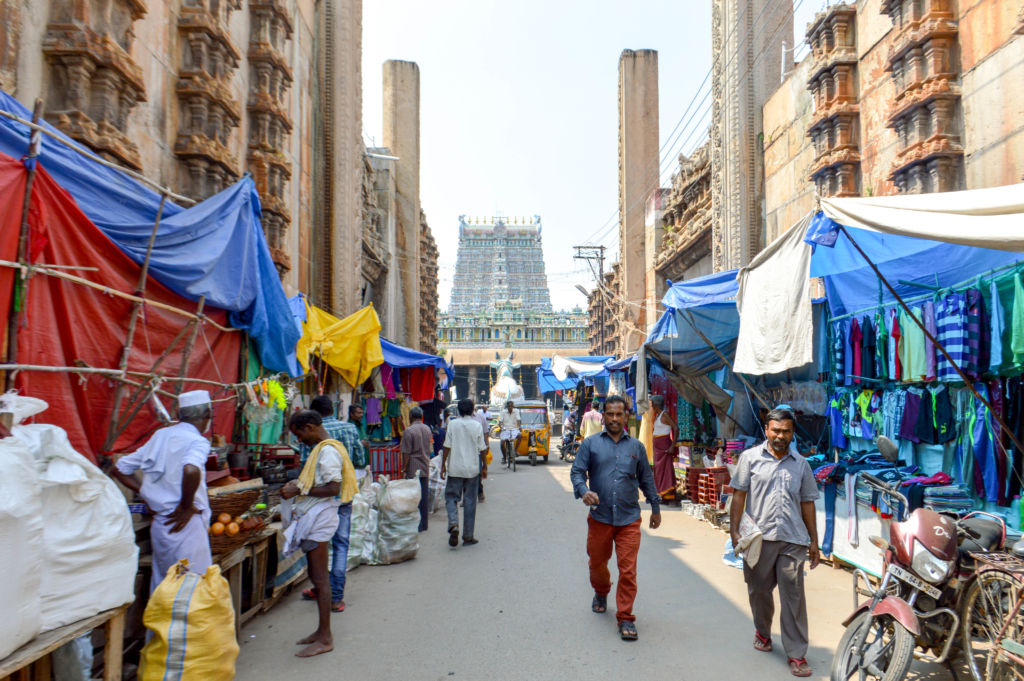
My grandfather was a farmer from Farley, Iowa, but in many ways he was also an entrepreneur. He experimented with innovative farming techniques, calculated and assumed financial risks in unpredictable environments and, most importantly, created value-added products for his customers. Like any effective executive, he managed multiple streams of revenue, aligned short-term objectives with steadfast goals, and grounded his decision-making in sustainability, which prioritizes long-term profitability. His land was both a business and a source of livelihood for himself and his community. It provided income and employment, food and shelter, stability and prosperity. Indeed, this is the impact and importance of entrepreneurship: It is, at its core, dignifying.
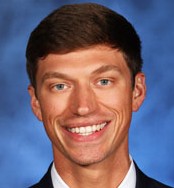
Chris Owen
But more recently, for farmers in both the U.S. and India, the narrative has been quite different. Water wars, climate change and debilitating debt due to stagnant crop prices have made their profession less about dignity and more about survival. Farming, it seems, has become a bad business. Many farmers are being forced to abandon their rural communities in search of “greyer pastures” in growing urban centers. In India alone, these urban centers are expected to grow by 250 million residents during the next 20 years. Rural Indians are moving into cities for work, the lure of modern conveniences, or simply to be closer to fellow migrant family members. Considering that India will also have the largest millennial workforce in the world by 2027, we must ask: How will cities sustain their residents’ need for fresh food, clean water, waste management and gainful employment? Government funds are already being stretched thin by increasing demands on transportation infrastructure, an expanding energy grid and other public services. National or international aid organizations may provide relief for society’s most destitute, but that still leaves a large middle class searching for economic stability—as well as lingering concerns regarding environmental sustainability and community cohesion.
Addressing these concerns is the primary purpose of Poornatha—the Madurai-based social enterprise with which I partnered as a WDI Global Impact Fellow this past summer. The mission of Poornatha is to foster socio-economic vibrancy and entrepreneurial resilience that contributes to cultural preservation and community-building throughout India. In collaboration with the Michigan Academy for the Development of Entrepreneurs (MADE) and WDI, we began an effort to co-design a scalable, transferable, affordable coaching curriculum for entrepreneurs in emerging economies. The goal of this program is to equip and empower entrepreneurs as values-centered, data-driven decision-makers who build enduringly successful businesses that strengthen their local communities. Over the course of 10 weeks, the team of four coaches and I interviewed two dozen entrepreneurs in Madurai to identify their most salient needs as business leaders. What were their most pressing skill or knowledge gaps? What were their specific market opportunities or business growth goals? What were the core values of their organizations? These conversations informed what is now an entrepreneurship education program for leaders of family-owned businesses, featuring training in cash flow analysis, marketing and brand management, leadership development and, most importantly, sustainable strategic decision-making.
Madurai has been an ideal test site for this program. Located in the southern state of Tamil Nadu, Madurai is both a holy site and a gritty industrial center nicknamed “The Temple City” and “The City that Never Sleeps.” Reminiscent of an American Rust Belt metropolis, it is home to rubber factories and sand mines, raw material distributors and textile manufacturers—and an engaged entrepreneurship network grappling with an influx of residents from surrounding rural communities. Though many business owners in the Poornatha Network are simply trying to provide sustenance for their families while navigating complex competitive markets, most also acknowledge and advocate for business practices that promote economic, environmental and social well-being. The challenge, of course, is identifying and incorporating these win-win-win solutions into traditional businesses models.
Entrepreneurship in India is primarily associated with local job-creation rather than scalable innovation. This focus does indeed promote human dignity by fostering local socio-economic vibrancy, but it also bypasses another important contribution of business to society: the creation of new products or services that address pressing human and/or environmental needs. It is these eco-innovations that will transform markets and enable local entrepreneurs to apply—and benefit from—the “both/and” triple-bottom-line approach to decision-making.
My grandfather lived on the same piece of land nearly his entire life. For his 80th birthday party, the list of attendees was so long that our family had to rent City Hall for the reception. He was a hometown hero—a food grower, a job provider and a respected cornerstone of his community. He was, in my mind, a triple-bottom-line entrepreneur who lived with dignity by cultivating the dignity within those around him. Though this permanence of place may be a luxury for most farmers, rural residents, small business owners and urbanites living in India today, Poornatha hopes that this new entrepreneurship education program will nurture a business ecosystem that promotes socio-economic vibrancy, sustainability and, most importantly, human dignity throughout Tamil Nadu and beyond.
Chris Owen is a dual-degree student at the Ross School of Business and the School for Environment and Sustainability at the University of Michigan.
This article was originally published on NextBillion, which is managed by WDI.
Image: Market in Madurai, India (via Francisco Anzola)
In September, 2018 WDI and the Miller Center for Social Entrepreneurship at Santa Clara University released a paper exploring opportunities for greater alignment between clean energy enterprises and investors operating in India. The paper, “Closing the Circuit: Accelerating Clean Energy Investment in India,” is based on the experiences of enterprise managers and investors involved in the Energy Access India (EAI) program. EAI was a three-year, USAID-funded program that ended in September 2018 and intended to narrow the gap between clean energy enterprises and investors.